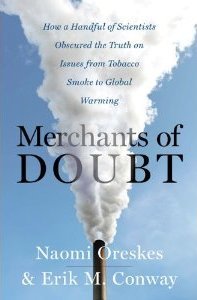Naomi Oreskes, Professor of History and Science Studies at the University of California San Diego, will be coming to New Zealand this month to discuss her latest book, Merchants of Doubt.
 The book examines the overstatement of uncertainty in scientific debates such as climate change, acid rain and the health effects of tobacco and was co-written with Erik Conway – who was also recently in New Zealand discussing climate change. Ahead of her visit, Naomi talked about her work with reporter Chris Barton for the Weekend Herald.
The book examines the overstatement of uncertainty in scientific debates such as climate change, acid rain and the health effects of tobacco and was co-written with Erik Conway – who was also recently in New Zealand discussing climate change. Ahead of her visit, Naomi talked about her work with reporter Chris Barton for the Weekend Herald.
An excerpt (read in full here):
It’s when she’s asked if she sees any connection between global warming denial and Holocaust denial that Naomi Oreskes kicks for touch.
“I would feel very reluctant to be saying much about that phenomenon,” says the University of California professor of History and Science Studies.
“Other than to say we know denial is a powerful force and we see it in lots of different ways and different places for different reasons.”
She may not want to look at the connection, but the “powerful force”, how it operates and its distortion of scientific facts are at the centre of Oreskes’ Merchants of Doubt, co-written with Erik Conway.
The book covers a swathe of history beginning in the 50s, telling the story of how a handful of American scientists denied the harms of tobacco, acid rain, ozone depletion, DDT and global warming.
In the process the scientists, backed by right-wing think tanks, obfuscated and delayed regulatory remedies to address the harm – in tobacco’s case for more than 50 years.